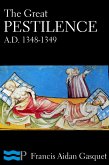In "The Epidemics of the Middle Ages," J. F. C. Hecker presents a meticulous historical account that delves into the devastating plagues that struck Europe between the 14th and 17th centuries. Through a rich tapestry of contemporary accounts, medical writings, and societal observations, Hecker employs a scholarly yet accessible literary style that vividly embodies the tragic impact of these epidemics on medieval society. The book critically engages with the cultural and historical context of the era, elucidating how fear and superstition shaped public responses to disease alongside emerging medical knowledge. J. F. C. Hecker, a noted historical physician, draws upon his extensive expertise in medicine and history to illuminate the interplay between health crises and societal evolution. His background allows him to merge the scientific understanding of epidemics with the human experience, offering insights into how these catastrophic events influenced public health policies and social structures. Hecker's work is further enriched by his vigorous advocacy for the importance of understanding history through a medical lens, demonstrating how past pandemics inform contemporary health discourse. This compelling chronicle is highly recommended for readers interested in medical history, sociology, or the intricate ways disease shapes civilization. Hecker's insightful analysis not only deepens our understanding of medieval epidemics but also resonates with today's ongoing struggles against infectious diseases, making it an essential read for both scholars and general audiences.
Dieser Download kann aus rechtlichen Gründen nur mit Rechnungsadresse in A, B, BG, CY, CZ, D, DK, EW, E, FIN, F, GR, H, IRL, I, LT, L, LR, M, NL, PL, P, R, S, SLO, SK ausgeliefert werden.









